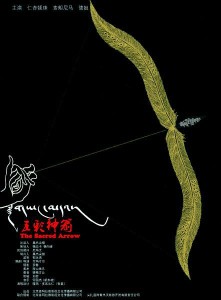The Sacred Arrow
五彩神箭
China, 2014, colour, 2.35:1, 96 mins.
Director: Pema Tseden 万玛才旦.
Rating: 4/10.
Dramatically thin tale of male rivalry between two champion village archers.
Jainca county, Huangnan Tibetan Autonomous Prefecture, eastern Qinghai province, western China, the present day. At the traditional archery contest between two villages for the Sacred Arrow – which represents strength, bravery, peace and joy – Nyima (Sonam Nyima) from Damo beats Dradon (Rinchen Dondrup) from Lhalong. It’s the second year in a row that Damo village has won the contest. Lhalong’s Dradon storms off in a huff and goes drinking with his friends; his younger brother tells him he’s shamed their village. Later, Dradon is furious when he catches his younger sister Dekyid (Dekyid) with Nyima in a forest at night, despite the fact that Dekyid says they love each other. To win back the honour of Lhalong village, Dradon’s younger brother arranges a kids’ archery contest with Damo village in a month’s time. Meanwhile, during an argument over Dekyid, Nyima insults Dradon and ends up injured. Dradon’s father (Lobsang Chospel) apologises for his son’s behaviour and tells him not to be so hot-headed. At the kids’ archery contest, Damo village wins again. Undeterred, on the eve of Nyima and Dekyid’s marriage, Dradon challenges Nyima to a private archery contest: if he loses, Nyima promises he won’t marry Dekyid.
REVIEW
Writer-director Pema Tseden 万玛才旦 finally gives the audience a partial break in his fourth feature, The Sacred Arrow 五彩神箭, a tale of male rivalry between two champion archers in different villages that, though set in the present, is shot through with a mythic flavour of yore. Pema Tseden, 44, an ethnic Tibetan born and raised in the Tibetan Autonomous Prefecture of Hainan, Qinghai province, China, has become a poster boy of the festival circuit for a series of grindingly slow art movies, shot in a distanced style, that have been given a lot of critical slack simply because of his ethnicity. With its more regular shooting style and more natural characters, Arrow is a considerable departure from his previous The Silent Holy Stones 静静的嘛呢石(2005), The Search 寻找智美更登 (2009) and Old Dog 老狗 (2010). But for all of the film’s immersion in traditional Tibetan culture, there’s still no disguising the fact that it’s an awkwardly constructed, undramatic slice of cinema that’s thin on all fronts except the ethnic one.
Set in a Tibetan autonomous prefecture in eastern Qinghai province, China, the story focuses on a champion archer (broodingly played by Rinchen Dondrup, Ganglamedo 冈拉梅朵, 2007) who goes off in a major sulk after losing an annual archery competition and gets even huffier when he finds his rival (charismatic but stiff Sonam Nyima 索朗尼马) is courting his younger sister (pretty but dull Dekyid 德姬, Taste of Tsampa, 拉卜楞人家, 2010). Given the shortage of character conflict and dialogue, and the script’s bumpy construction, the film is largely animated by the cast of kids, who organise an alternative archery competition of their own. The widescreen photography by Luo Pan 罗攀 (Ganglamedo; Old Fish 千钧。一发, 2007; Einstein and Einstein 狗13, 2013) makes the most of the rugged and wooded landscape – as it could hardly fail to do – though it’s bathed in an ochry-yellow hue that robs it of real majesty, a gap not filled by the uninspiring music of Singaporean composer He Guojie 何国杰 (Warriors of the Rainbow: Seediq Bale 赛德克•巴莱, 2011).
CREDITS
Presented by Beijing Himalaya Audio & Visual Culture Communication (CN). Produced by Beijing Himalaya Audio & Visual Culture Communication (CN), Jainca County Government (CN).
Script: Pema Tseden. Photography: Luo Pan. Editing: Liu Fang, Guru Wangyal. Music: He Guojie. Art direction: Hodoyama Yiho. Sound: Dukar Tsering, Rennie Gomes. Visual effects: Kontar Gyal.
Cast: Rinchen Dondrup (Dradon), Sonam Nyima (Nyima), Dekyid (Dekyid, Dradon’s younger sister), Lobsang Chospel (Dradon’s father), Tobgyal (village chief).
Premiere: Shanghai Film Festival (Competition), 17 Jun 2014.
Release: tba.
(Review originally published on Film Business Asia, 28 Jun 2014.)
